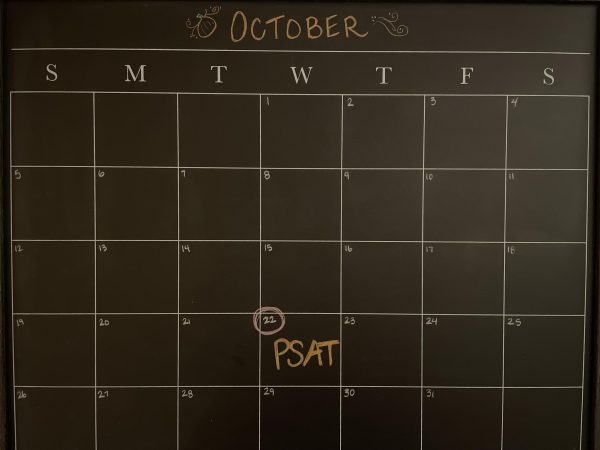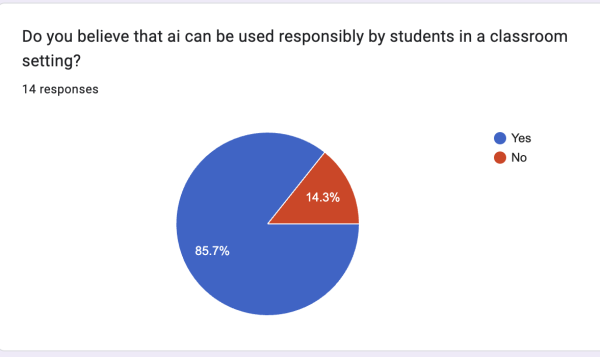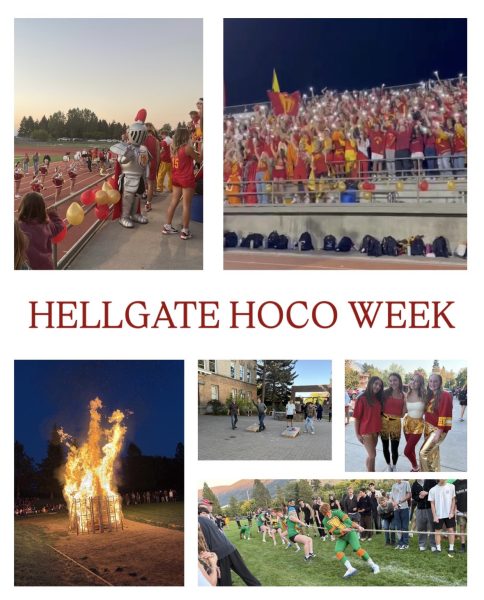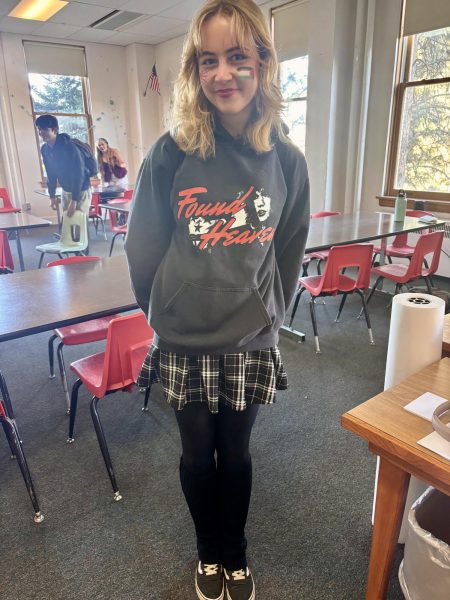Hellgate Seniors Reflect On College Applications
February can be a cold and bleak month, but for many high school seniors it brings a reason to rejoice: the end of college applications. After several months of application deadlines clouding students’ thoughts, the process is finally over, placed in the hands of the admissions officers.
College applications can be both exciting and stressful, and for this year’s applicants there was also the unpredictability and unexpected changes brought on by a pandemic. Perhaps the biggest difference was the difficulty of visiting schools. Grace Gibson-Snyder, a senior at Hellgate, felt that not being able to visit schools had the biggest impact on her application process. “I think it made it harder to narrow down where I wanted to apply because I had no idea how rural they felt, or if I would like being in the middle of a city, or any of that,” she said.
Gibson-Snyder isn’t alone in this difficulty. Spring of junior year is the prime time to visit schools, but many students’ plans were unexpectedly disrupted by COVID-19. Marion Jones, another Hellgate senior, had planned to go on a big trip to visit schools along the west coast, but it was cancelled twice. As a result, she is “going in blind,” applying to places where she has never set foot.
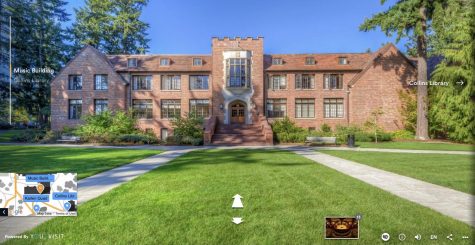
The near impossibility of traveling this year has led to a huge rise in virtual tours. Colleges have shifted their focus, putting extra effort into providing online resources for students. Virtual tours are by no means the same experience as visiting in person, though. A surprisingly large number of college students say they chose their school because they felt a sense of belonging after visiting campus. It’s difficult, maybe even impossible, to replicate that feeling virtually. Hellgate senior Colton Quirk said that not visiting schools will make his final decision a lot harder, as he won’t have that feeling about the campuses.
However, virtual tours provide at least some knowledge of the campus and are more affordable, especially for far-away schools that require multiple plane rides to visit. Gibson-Snyder also appreciated the directness of virtual events. “You can just ask questions instead of having to glean all the information from a campus tour,” she said. Whether tours, workshops, or information sessions, college resources are more accessible now than ever. ![]()
Another difference in applications this year has been the interviews, which are entirely virtual for many schools. The general awkwardness of Zoom adds a whole new level of complexity to an already nerve-wracking process. Not to mention technical difficulties that leave you staring at a frozen image of an interviewer mid-sentence, unsure if you’re frozen too. “It’s just a little bit harder to connect with an interviewer when you’re doing it over Zoom instead of meeting in a coffee shop,” said Gibson-Snyder.
At least a few good things have come out of the pandemic, though, and one of them is College Board’s decision to eliminate the SAT optional essay and subject tests. The change was described as an effort to “reduce demands on students.” College Board said in a press release that the process was “accelerated by the pandemic,” though it had already been underway.
Up until the early 2000s, students had to take a minimum of three subject tests. Today, nearly all schools have dropped this requirement. The optionality has led to a large dip in the number of students taking the test. According to InsideHigherEd, in 2017 about 1.8 million high schoolers took the SAT, but only 219,000 took a subject test. However, because subject tests are still “recommended” most places, many students applying to selective schools felt pressured to take them.
More and more schools are on the way to becoming entirely test-optional, not requiring the SAT or the ACT. The University of California system had been considering going test-blind (not considering scores at all, even if they are submitted) even before the coronavirus hit. The pandemic is further encouraging this shift. According to the nonprofit watchdog FairTest, more than 1600 schools did not or are not requiring applicants to submit test scores this year, a trend that may continue.
It’s questionable how effective standardized tests are at predicting future performance, and data shows that underprivileged students and students of color typically score lower, putting them at a disadvantage. Tests also put a lot of stress on students to perform well at something they may or may not be naturally good at. “There’s a lot of pressure being judged on those scores and having them be compared to others,” said Jones. “Having the SAT and ACT be optional took a ton of stress off of the process.”
This is a welcome change, because the process is stressful enough already. Building and compiling the many aspects of an application – transcripts, extracurriculars, supplemental essays – and keeping track of deadlines can be difficult to manage on top of many students’ already busy schedules. This is especially true for students like Gibson-Snyder, who are doing the full IB program and have extra papers to write for that. “I wouldn’t say I’m a procrastinator necessarily, but with all of the things to do it always felt like I was doing everything last minute,” she said. “I didn’t have the time to work ahead on things because I always had something that was due sooner.”
One of the most stressful and time-consuming parts of the application is the essays. Most schools require the Common Application personal essay, and many others also require multiple supplemental essays, wanting students to go into detail about who they are and why they want to attend. It can be challenging to show a deep understanding of each individual school. “When you haven’t visited most of them it’s hard to distinguish between most of them,” said Gibson-Snyder.
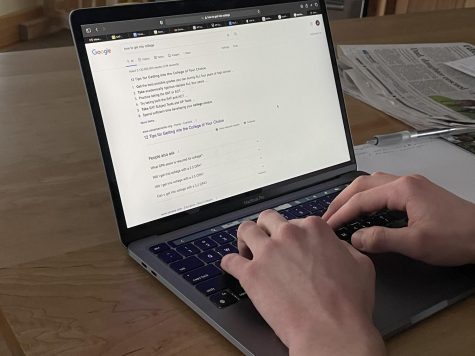
However, the parts of the application that require more work, like the essays, are important and valuable. They help students fully represent themselves in a well-rounded way, forcing schools to look beyond grades and test scores. “I think all of the applications were really holistic and wanted to get to know me, rather than some fabricated person,” said Quirk. Jones agreed. “Each school gives you an opportunity to expand on things you are passionate about, which I found reassuring,” she said. “I just hope everything is looked at and understood.”
These seniors’ advice for underclassmen? Start early. “I had planned to start writing all my essays, like getting first drafts out in the summer. I did not do that. I went kayaking instead. Definitely start on the essays,” said Gibson-Snyder. “I mean don’t overdo it, don’t start prepping freshman year, but definitely work ahead.” Starting earlier doesn’t just ease the stress of upcoming deadlines, it creates the ability to drop or add schools and change essays if needed. Jones also recommends narrowing down your list of schools by factors like interests and location so that a list of 20 schools doesn’t create an overwhelming amount of work.
However the process is approached, it will open doors to the future, to a world beyond high school. This is a thrilling prospect, one that makes applications exciting and at times even joyful. In general, though, college applications won’t be missed. Students will gladly move forward into the future, leaving the stress and complexity of applications behind. And hopefully at some point soon, the pandemic as well.
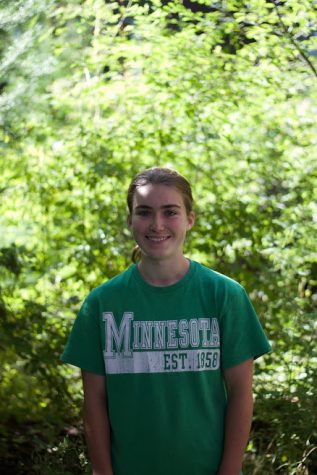
Hello! I'm a Senior at Hellgate and this is my second year writing for the Lance. In addition to writing, I enjoy mountain biking, playing cello, and competing...

